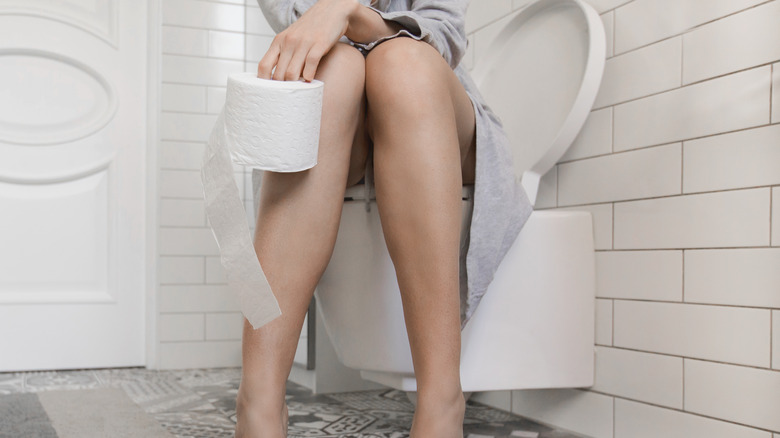What Happens To Your Skin If You Don't Poop Every Day
With more and more research being done on gut health and how it contributes toward overall health, every facet of our digestive system is under the microscope. From how we chew our food and how our intestines digest nutrients to how we discard waste via pooping and urination, all of it can have an effect on our body's health. Which brings us to the topic of pooping. According to some experts, if you don't have bowel movements every day, you could be putting your skin in danger of breakouts, a dull or oily complexion, and even other skin conditions like eczema and psoriasis. Let's break it down.
Your body has a system in place to release toxins and waste from it. While your skin does some of the work related to eliminating waste by sweating, healthy bowel movements also make sure this happens on the daily, according to naturopathic doctor Briana Botsford. When this process is disrupted by constipation or irregular pooping habits, it's going to show up on your skin as acne and other irritations.
A dermatologist and hair transplant surgeon, Dr. Manjot Marwah, told the Hindustan Times that acne isn't the only concern if you're having constipation. You could also find yourself dealing with dark circles and puffiness under your eyes, skin spots, and rashes. In addition, there's some evidence linking eczema with gut health. Not pooping every day can also affect your hormones, which can, in turn, manifest on your skin.
The poop, hormones, and skin connection
Estrogen buildup in women caused by not pooping regularly can cause skin disruptions, per Jolene Brighten, a naturopathic doctor and president and Chief Medical Officer at Rubus Health in Portland, Oregon (via mindbodygreen). "If your bowels aren't moving, your estrogen sticks around longer than it should and goes back into circulation in the body. You have to poop every day to get your estrogen out."
While low estrogen levels are linked to dry skin, an excess of it can lead to oily skin and hyperpigmentation. According to acupuncturist and herbalist Mona Dan (via Well+Good), based on traditional Chinese medicine, your skin's pallor and texture can also change depending on your pooping habits. Someone dealing with constipation could end up having a dry and dull complexion, while someone with loose stool movement might have oily skin.
Did you just realize that you're not pooping every day? Has all this information made you worry about your skin health? Regular bowel movement might look different from one person to another, say some experts.
It's not about pooping every single day, but about pooping regularly
How often you should really be pooping could vary. Some people might go daily, while others might poop three times a week — and this is fine, according to experts (via the Cleveland Clinic). The important thing to remember is that you stay regular with your bowel movements for optimal skin health and to prevent other health complications like hemorrhoids, anal fissures, and infections.
When you should be concerned is when you poop less than three times a week. This might be a sign that you're constipated. Clinical nutritionist Jacqueline Evans recommends increasing your fiber intake with foods like leafy greens, vegetables, fruits, legumes, and nuts, exercising regularly, drinking plenty of water, and looking into probiotics. "Adding good bacteria from probiotics may improve transit time, stool frequency, and stool consistency," she explains.
If you're struggling to pass stools less than three times a week, straining excessively while on the toilet every single time you go, or experiencing any pain in your lower abdomen, you should be seeing your doctor about your poop habits.



